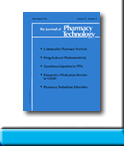 |
 |
Patient Attitudes Concerning Pharmacist Inquiry of Spirituality in a Community Pharmacy
Geoffrey Twigg, Mark S Johnson
To request full article click here.
Background: Health care professionals, including physicians and nurses, are becoming more aware of the importance of addressing and incorporating spirituality into patient care. Less is known concerning pharmacist inquiry of patient spiritual beliefs.
Objective: To observe patients’ attitudes in having the pharmacist inquire about their spiritual beliefs in the
community pharmacy setting and to determine patient characteristics that may be predictive of these
attitudes.
Methods: This study was conducted in an independent pharmacy on the Eastern Shore of Maryland over a 2- week period. Patients voluntarily filled out an 11-question survey assessing baseline religiosity, using the Duke University Religion Index (DUREL) and attitudes on inquiry by the pharmacist regarding spirituality. The results were analyzed to assess patient attitudes and correlations predictive of these attitudes.
Results: A total of 105 participants completed the survey. Participants scored high on organizational, nonorganizational, and intrinsic religiosity as assessed by DUREL. Survey results revealed that most patients felt that it was appropriate for both physicians (69%) and pharmacists (57%) to inquire about spiritual beliefs, most (86%) patients believed that prayer was important in treatment, 57% of patients felt comfortable having their pharmacist offer prayer, and 93% felt that spiritual health positively impacts physical and mental health. Organizational religiosity proved to be the best baseline predictor of patient desire in having spirituality acknowledged in pharmacy care (OR 1.733; p = 0.002). Other strong predictors included intrinsic religiosity (OR 1.271; p = 0.004), the patient’s desire to have physicians inquire about spirituality (OR 10.365; p = 0.001), and patient comfort level with pharmacist prayer (OR 3.729; p = 0.039).
CONCLUSIONS: This pilot study provides initial evidence that patients are generally supportive of pharmacist inquiry concerning their spiritual and religious beliefs in the community pharmacy setting, with more frequent organized religious attendance being the best predictor. Further studies are needed to validate these results.
J Pharm Technol 2013;29:170-4
|
|
|
||
|

